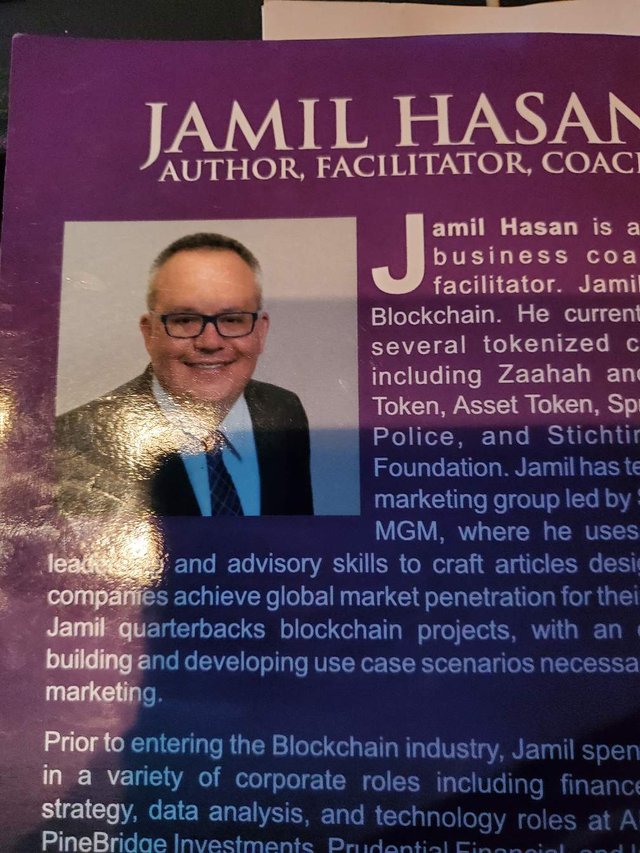Author Jamil Hasan reads Chapter 4 from his book Blockchain Ethics: A Bridge to Abundance.
During this Crypto Winter, and winter in New England, author Jamil Hasan finds it is important to remind others of the promises of the positive social impact of open-sourced technology.
Text:
Cracking the Glass Ceiling
Krissy Smith grew up in an all-American upper middle-class home, steeped in capitalism, patriotism, and a deep love for her community and country. Her father, Fredrick J. Smith, graduated from the US Military Academy at West Point in 1965 and served tours in both Korea and Vietnam. In 1970, he left the military and joined Lukens Steel in Coatesville, PA, as an industrial engineer and supervisor. Over the next four decades, he worked his way up the corporate ladder, eventually becoming Vice President of Operations.
Looking back at her childhood, Krissy jokes that she “grew up in a country club.” She attended private Catholic school in nearby Villanova, and often spent time at the country club with her parents, playing tennis and socializing with the children of other Lukens Steel executives. This isn’t to say that she was completely shielded from the outside world: remembering the impact of the Vietnam war and Fred’s involvement in it, the Smiths worked to bring Vietnamese refugees to America.
While Krissy enjoyed the benefits of a wealthy childhood, she also sometimes saw the dark side of capitalism. She still remembers the summer when she was promised $300 if she painted a garage, but only received $50. And, all around her, she saw evidence that her problems with capitalism were minor compared with the struggles of others. Throughout Coatesville, she could see the struggles of steel workers and their families, and soon learned that wealth provided her family with many opportunities that were not available to poorer kids in her town.
Even so, Krissy followed her father’s lead into the white-collar workforce. She went to Bucknell University, where she graduated with degrees in geology and biology, before moving on to Utah State, where she received a Master’s degree in geology. Her scientific training led her to American International Group (AIG), where she rose to regional manager for environmental underwriting in San Francisco.
In 2005, she left AIG to raise her children, and was a stay at home mom for ten years, completely immersed in her children’s lives. That went very well...until it didn’t. In 2015, she and her husband separated, and Krissy faced new family and financial pressures. After ten years out of the workforce, she found that her connections had dried up, so when she went back to work, it was as a waitress at Cracker Barrel. In a matter of ten years, she’d gone from a high perch on the capitalist pyramid — a corporate executive for a global company with a Master’s degree — to a spot near the bottom. Now a local waitress with challenging hours, no health insurance, and suboptimal health conditions, she felt alone and isolated. Her father, who had taught her about the basics of capitalism, made no secret of the fact that he believed his daughter was floundering.
While devastating, Krissy’s experience isn’t uncommon. Eighty percent of women, including those who wish to leave the workforce to focus on family, do not leave out of fear of losing out in the long run if they do.[i] On the other hand, when they return, they often find that they’ve lost their place in the corporate climb.
Confronted with the difficulties of finding work, Krissy began exploring the sharing economy. She also started working at Rover, a dog-sitting service, as well as Uber. Eventually, her divorce settlement came through: on the bright side, she was left with $100,000; unfortunately, she also lost access to her children.
In October 2017, looking for ways to pay her legal bills and help her with her ongoing custody battle, Krissy took another step into the new economy. She bought shares in Bitcoin and Ripple, another cryptocurrency, through her IRA. Two months later, the price of Ripple spiked, and she sold her positions. Her earnings made her a millionaire.
Krissy was extremely fortunate, and her experience at AIG helped her recognize when it was a good time to consolidate her gains and leave the market. That said, her case shows a way that open-sourced Blockchains can open opportunities for people who have been pushed out of the workforce and sidelined by the economy.
Krissy’s story also shows the ways that the impact of the blockchain can ripple across the economy. Since selling her shares in December, she has been very active in philanthropy. She seeded a blockchain startup and has reached out to Bucknell University to support their activities with funding Blockchain projects for local steel towns. She has also invested in both Zaahah and Roofstock, a turnkey real estate company that democratizes real estate investing.
Krissy’s also working to show the struggles experienced by people like her. She recently became a Star Producer for the documentary Erasing Family, directed by Ginger Gentile and starring Tamra Judge. The film focuses on “erased families,” the parents and siblings that disappear from a child’s life after divorce. It also highlights efforts to encourage young adults to reunite with their family members and showcases the stories of families that have found each other after years of loss and distance.
Based on her own experience, Krissy is trying to change the general perception of Blockchain. Many people, she argues, see it as a quick money thing, but she sees it as a way of combining empathy and economics to build communities and foster relationships. “It's not a stop gap,” she says. “It's meant for something bigger.”
[i] https://womenintheworkplace.com/Women_in_the_Workplace_2017.pdf

Posted using Partiko Android
Hi! I am a robot. I just upvoted you! I found similar content that readers might be interested in:
https://steemit.com/blockchain/@conncrypto/blockchain-ethics-a-bridge-to-abundance-chapter-4-cracking-the-glass-ceiling
Downvoting a post can decrease pending rewards and make it less visible. Common reasons:
Submit